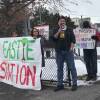Anaya Raikar, 15, is a Massachusetts Field Representative for Our Climate, a nonprofit that empowers youth to win science-based, equitable and intersectional climate change justice policy. She and her peers skipped school last week to demand climate action at the State House, and she joined All Things Considered host Arun Rath to discuss the experience. This transcript has been lightly edited.
Arun Rath: Give us a little bit of your background and how at a relatively young age, you came to become such a strong climate advocate.
Anaya Raikar: I started my climate work earlier in the school year. I joined Our Climate Massachusetts after hearing the work that some of my friends have done in this organization. And I was able to work with many youths from all across Massachusetts, as well as some adult allies. A main priority of ours was writing, presenting and eventually lobbying for a couple of really interesting climate policies.
Rath: Tell us about that. What were those initial things you were working on?
Raikar: We developed a list of priority bills; I can speak to a couple of these. An example of this was the Interdisciplinary Climate Education Justice Bill. This was something that we ourselves had written with some support from teachers in the area. Climate science is something that's kind of talked about in schools, but we wanted to bring more attention to the humanitarian aspect of climate change and have that also be taught in schools. We also wanted support from teachers because, of course, they're the ones who will be teaching this material. We reached out to many groups. We wrote this bill, and we eventually lobbied for it in our lobby week.
Rath: When you talk about the humanitarian aspects, are you talking about things like people who've become climate refugees — essentially people who are on the receiving end of the worst of climate change?
Raikar: For sure. We wanted to center the voices of those who have been most impacted by climate change. We were primarily thinking on a local level; for example, air quality in certain neighborhoods in Massachusetts. This is what we call our "environmental justice communities," so communities of color, communities that will be suffering the effects of climate change the most, essentially.
Rath: Right. Certain areas and certain people are most exposed to environmental hazards.
Raikar: For sure.
Rath: So tell us about the visit to the State House. Did you meet or speak with any lawmakers?
Raikar: Yes, I was able to meet with a couple of Massachusetts legislators, and so were the other youth who came to this lobby day. We began the day by convening in Boston and sort of prepping for our meetings. We eventually walked to the State House, and that was a really powerful moment. We were able to do some chants and make some speeches outside the State House. Then, we went in and spoke to our legislators about the priority bills that I talked about. We're hoping that they will commit to cosponsoring or otherwise publicly supporting these bills.
Rath: How were you received by the lawmakers? Do you feel like they were receptive to what you had to say?
Raikar: It's very early in the legislative session, and I can't be fully sure if any of the legislators we spoke to will actually commit to any of our requests because there's always the option to listen, but then kind of ignore our requests. Some of this happened to my colleagues last session with the bills that we were advancing. But I'll say that the ball is now in the legislators' court, and we'll just take it from there.
"Climate advocacy doesn't work without adult allies."-Anaya Raikar
Rath: I have kids your age, and I often find myself apologizing to them and to young people in general about this horrible situation that we are going to be handing off to you in terms of climate change and the planet. You know, my generation hasn't done the best job. Do you have more faith in your generation to be able to pull off what we've neglected to do?
Raikar: I have faith in [the] youth after seeing the success at this lobby week, seeing how many people were willing to skip school and come to the State House to annoy our legislators to actually pass some policy. I will say, climate advocacy doesn't work without adult allies, and it's wonderful being able to work with adults and also hear their perspectives on this issue.
Rath: Do you mind if I ask, just based on your name, are you of South Asian background?
Raikar: Yes.
Rath: I'm just thinking about your parents and I have to think, on the one hand, there's probably a great deal of excitement about what you're doing. But also, South Asian parents may not be so thrilled about skipping school. So how do they feel about what you do?
Raikar: I will admit, they were a little skeptical at first about me missing school, especially since I'll be missing a couple of important classes. But after hearing the work that I would be doing, they definitely got on board. Also, my dad works in the renewable energy space, so it was great hearing that support from him as well.









